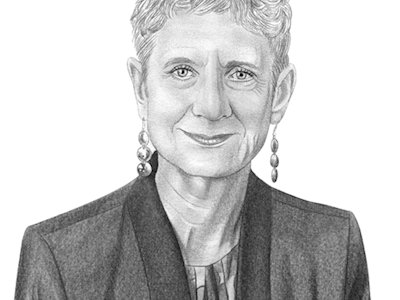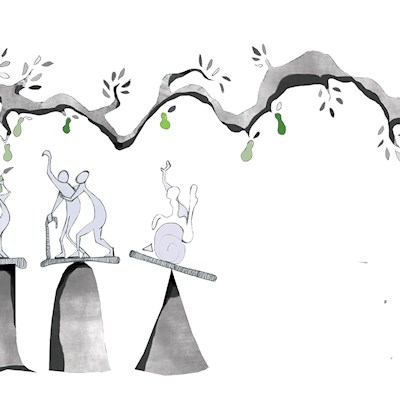Challenging occupational therapy´s theoretical status quo
Challenging occupational therapy´s theoretical status quo
Occupational therapy’s theories and conceptual models encapsulate the profession’s unique body of knowledge and assumptions about occupation, and inform the organizing principles that underpin therapists’ practices (Hammell, 2019). This article aims both to highlight the imperative of challenging occupational therapy’s theoretical status quo, and to encourage a critical stance towards the adequacy of the theories promoted within the profession.
It is relevant to state my position as a white, straight, class-privileged, temporarily non-disabled, cis-female. (To be “cis-gendered” is to identify with the gender one was assigned at birth). I am aware that I derive material benefits, occupational advantages and social privileges from my white skin and able body that I have not earned. And I acknowledge that the perspectives that derive from my position and shape my ideas are inevitably blinkered, slanted and incomplete.
Theories derived from a minority viewpoint
Occupational therapy has been dominated by theories and models of practice arising in the Global North, and informed by a minority viewpoint: white, Eurocentric, Judeo-Christian, urban middle-class, heteronormative and ableist (Hammell, 2009, 2020a). This unique perspective has been presented as if “universal” (Hammell, 2020a), and the theories and models it underpins have been promoted internationally as if they are “correct”.
Critics have contested the presumed universalism of theorists’ perspectives, and drawn attention to the reality that occupational therapy’s dominant theories reflect unique perspectives shared among privileged élites (Hammell, 2009; Iwama, 2006). The problem is not the idea of universalism and the premise that humanity shares some basic values, but rather, that Eurocentric hegemony poses as universalism (Appiah, 1992); imposing a specific set of values and perspectives while simultaneously obscuring and devaluing the perspectives of others.
Assumptions embedded in the theoretical status quo
By focusing exclusively on three categories of occupation valued by minority-world theorists, occupational therapy has obscured, ignored and devalued all other occupations valued by service users, such as those that foster connections with families, communities, ancestors and cultures; resource-seeking and survival occupations, occupations undertaken to engender hope or foster creativity, occupations chosen to assert gender identities, or occupations enacted as acts of resistance (Hammell, 2020a). In addition, the profession has failed to address the priorities of people who choose to engage in shared, collective and co-operative occupations because they provide opportunities for interdependence (Asaba, 2008; Iwama, 2006); occupations undertaken to contribute to the wellbeing of others, to enact reciprocity, enrich relationships, strengthen social roles, and fulfil duties, responsibilities and obligations to others (Hammell, 2020a). Moreover, little attention has been focused on broader issues, such as the impact of environmental degradation and climate change on occupational engagement, health and wellbeing (Hammell, 2021).
Occupational therapy’s theories have promoted independence, autonomy, and the idea that people can all make “informed and wise” occupational choices (Wilcock & Hocking, 2015, p.429). This fits with the prevailing socio-political myth of meritocracy, ubiquitous in the Global North, that portrays success (e.g. in one’s occupations) as the product of individual skill, determination and effort. Because this ideology ignores the social determinants of occupation, it effectively blames disabled people for any limitations in their occupational participation (Hammell, 2020b).
Occupational therapy’s theories and conceptual models encapsulate the profession’s unique body of knowledge and assumptions about occupation, and inform the organizing principles that underpin therapists’ practices (Hammell, 2019). This article aims both to highlight the imperative of challenging occupational therapy’s theoretical status quo, and to encourage a critical stance towards the adequacy of the theories promoted within the profession.
It is relevant to state my position as a white, straight, class-privileged, temporarily non-disabled, cis-female. (To be “cis-gendered” is to identify with the gender one was assigned at birth). I am aware that I derive material benefits, occupational advantages and social privileges from my white skin and able body that I have not earned. And I acknowledge that the perspectives that derive from my position and shape my ideas are inevitably blinkered, slanted and incomplete.
Theories derived from a minority viewpoint
Occupational therapy has been dominated by theories and models of practice arising in the Global North, and informed by a minority viewpoint: white, Eurocentric, Judeo-Christian, urban middle-class, heteronormative and ableist (Hammell, 2009, 2020a). This unique perspective has been presented as if “universal” (Hammell, 2020a), and the theories and models it underpins have been promoted internationally as if they are “correct”.
Critics have contested the presumed universalism of theorists’ perspectives, and drawn attention to the reality that occupational therapy’s dominant theories reflect unique perspectives shared among privileged élites (Hammell, 2009; Iwama, 2006). The problem is not the idea of universalism and the premise that humanity shares some basic values, but rather, that Eurocentric hegemony poses as universalism (Appiah, 1992); imposing a specific set of values and perspectives while simultaneously obscuring and devaluing the perspectives of others.
Assumptions embedded in the theoretical status quo
By focusing exclusively on three categories of occupation valued by minority-world theorists, occupational therapy has obscured, ignored and devalued all other occupations valued by service users, such as those that foster connections with families, communities, ancestors and cultures; resource-seeking and survival occupations, occupations undertaken to engender hope or foster creativity, occupations chosen to assert gender identities, or occupations enacted as acts of resistance (Hammell, 2020a). In addition, the profession has failed to address the priorities of people who choose to engage in shared, collective and co-operative occupations because they provide opportunities for interdependence (Asaba, 2008; Iwama, 2006); occupations undertaken to contribute to the wellbeing of others, to enact reciprocity, enrich relationships, strengthen social roles, and fulfil duties, responsibilities and obligations to others (Hammell, 2020a). Moreover, little attention has been focused on broader issues, such as the impact of environmental degradation and climate change on occupational engagement, health and wellbeing (Hammell, 2021).
Occupational therapy’s theories have promoted independence, autonomy, and the idea that people can all make “informed and wise” occupational choices (Wilcock & Hocking, 2015, p.429). This fits with the prevailing socio-political myth of meritocracy, ubiquitous in the Global North, that portrays success (e.g. in one’s occupations) as the product of individual skill, determination and effort. Because this ideology ignores the social determinants of occupation, it effectively blames disabled people for any limitations in their occupational participation (Hammell, 2020b).

Flawed practices informed by flawed theories
Critical analysis has revealed privileged blind-spots embedded in occupational therapy’s white Northern theories that have obscured inequities - such as racism, ableism, sexism, heteronormativity and gender binarism - and their impact on occupational choice and participation (Hammell, 2020b). (Ableism is an ideology that views typical - or usual - bodies, minds and abilities as superior, portrays impairments as inherently negative, and those with impairments as both flawed and inferior; Campbell, 2008). These theories - which have been imposed on the Global South, consistent with colonial practices - have provided a flawed basis for occupational therapy, and an inadequate foundation for a profession obligated to promote occupational rights (WFOT, 2019).Congruent with the profession’s collusion with the socio-political status quo, attention has been focused primarily on addressing individual deficits and dysfunctions while overlooking the injustices of the environment. Thus, for example, occupational therapists working to improve employment outcomes for racialised people with spinal cord injury have often limited their focus to individual behaviours and abilities while discounting ableist and racist barriers to employment, such as discriminatory transportation options and inequitable work opportunities. This ignores long-standing employment disparities between white people and racial minorities even in the presence of equivalent educational attainment (Krause et al., 2010), and the substantial differences in earnings among disabled white and disabled Black people even when employment is attained (Krause et al., 2010). Clearly, focusing solely on trying to change individuals makes occupational therapists complicit in maintaining the unjust status quo of discrimination, and in perpetuating the inequitable employment advantages that accrue to white, able-bodied people.
Entrenched structures, or systems, of policies and practices that embed inequities in all aspects of life - determining the availability of life chances and choices, and preserving the unearned advantages and opportunities of white, “able”, heteronormative people – are systemic injustices. These injustices are rooted in colonialism, wherein hierarchical classificatory systems were constructed to position white people as superior to all others, and to impose binary genders that position men as superior to women while entrenching heteronormativity (Lugones, 2007; Pihama, 2019). Devised to facilitate and “justify” colonial injustices, and make inequities appear “natural”, these socially-constructed hierarchies continue to maintain and reproduce ideologies of superiority and inferiority, and to perpetuate the unearned advantages that accrue to “able” white people (and especially men) in privileged socioeconomic classes.
For occupational therapists, this is important to acknowledge, because racism, ableism, sexism and gender binarism are interlinked and intersect; each reflects an ideology that upholds certain bodies as normal and desirable; each upholds as “natural” the inequitable advantages and privileges that flow to those with white, able, cis-male bodies; each effectively limits the occupational opportunities and choices of those who do not conform to these constructed norms (Hammell, 2020b, 2023). Occupation is socially determined; evidence shows that racism, sexism, class and caste inequities, patriarchy, misogyny, ableism, disablism, heteronormativity and gender binarism – injustices that are well-documented determinants of health and wellbeing - are also determinants of occupational engagement (Hammell, 2020a; 2020b). Ableist societies discriminate in favour of the dominant population, ensuring that disabled people cannot access the same benefits as their able-bodied counterparts (Robertson, 2016). Yet occupational therapy’s theories have demonstrated little interest in foregrounding and challenging the ways in which ableism and disablism shape, constrain and violate the capabilities, and occupational opportunities and rights of disabled people.
Indeed, occupational injustices expose some “white lies” promoted within occupational therapy’s theories: that occupational engagement is a product of individual will and ability; and that all people can choose their daily occupations (Hammell, 2020b). Research demonstrates instead that “the context in which all human activity takes place presents preconditions that limit the range of choice and constrain action” (Ottersen et al., 2014, p. 635).
Meeting occupational therapy’s obligations
The World Federation of Occupational Therapists (WFOT, 2019) identified the imperative and obligation for all occupational therapists to address systemic discrimination, oppression, and injustices such as racism, and to promote occupational rights. Meeting this obligation demands the transformation of a profession that has demonstrated little interest in systemic injustices as determinants of occupation.Philosophers contend that without critical thinking, each person unconsciously yet inevitably conforms to the ideas and practices that perpetuate the status quo (Shaull, 1993). If occupational therapy is going to evolve into a profession that promotes occupational rights, we must think critically, contest the status quo, disentangle our profession’s theories from their deep colonial roots, and refuse to individualize problems that derive from systemic injustices.
References
Appiah, K.A. (1992) In my father’s house: Africa in the philosophy of culture. Oxford: Oxford University Press.
Asaba, E. (2008) Hashi-ire: Where occupation, chopsticks, and mental health intersect. Journal of Occupational Science, 15, 74-79.
Campbell, F.A.K. (2008) Exploring internalized ableism using critical race theory. Disability and Society, 23(2):151-162.
Devlin, R., & Pothier, D. (2006) Introduction: Toward a critical theory of dis-citizenship. In D. Pothier, & R. Devlin. (Eds.). Critical disability theory: essays in philosophy, politics, policy, and law, (pp.1-22.), Vancouver: UBC Press.
Hammell, K.W. (2009) Self-care, productivity and leisure, or dimensions of occupational experience? Rethinking occupational “categories”. Canadian Journal of Occupational Therapy, 76(2),107-114. doi:10.1177/000841740907600208
Hammell, K.W. (2019) Building globally relevant occupational therapy from the strength of our diversity. World Federation of Occupational Therapists’ Bulletin, 75(1),13-26. doi:10.1080/14473828.2018.1529480
Hammell, K.W. (2020a) Engagement in living: Critical perspectives on occupation, rights and wellbeing. Ottawa, ONT: CAOT Publications ACE.
Hammell, K.W. (2020b) Making Choices from the Choices we have: The Contextual-Embeddedness of Occupational Choice. Canadian Journal of Occupational Therapy. 87(5),400-411. doi:10.1177/000841742096574
Hammell, K.W. (2021) Occupation in Natural Environments; Health Equity and Environmental Justice. Canadian Journal of Occupational Therapy. 2021;88(4),319-328. doi:10.1177/00084174211040000
Hammell, K.W. (2023) A call to resist occupational therapy’s promotion of ableism. Scandinavian Journal of Occupational Therapy, 30(6),745-757. doi:10.1080/11038128.2022.2130821
Iwama, M.K. (2006) The Kawa model: Culturally relevant occupational therapy. Edinburgh:
Elsevier.
Krause, J.S., Saunders, L., & Staten, D. (2010). Race-ethnicity, education, and employment after spinal cord injury. Rehabilitation Counseling Bulletin, 53, 78-86. doi:10.1177/0034355209345161
Lugones, M. (2007) Heterosexualism and the colonial/modern gender system. Hypatia, 2(1),186-209. doi:10.1111/j.1527-2001.2007.tb01156.x
Ottersen, O.P., Dasgupta, J., Bloiun, C., Buss, P., Chongsuvivatwong, V., Frenk, J, et al. (2014) The Lancet-Univeristy of Oslo Commission on global governance for health. The political origins of health inequity: prospects for change. Lancet, 383, 630-667. doi:10.1016/S0140-6736(13)62407-1
Pihama, L. (2019) Colonization and the importation of ideologies of race, gender, and class in Aotearoa. In, E.A. McKinley & L.T. Smith (Eds.), Handbook of Indigenous Education. (pp. 1-20). Singapore: Springer Nature.
Robertson, J. (2016). Exploring the conceptualization of disability and demographics as “facts”. In, J. Robertson & G. Larson, (Eds.), Disability and social change: A progressive Canadian approach, (pp.45-64), Halifax: Fernwood.
Shaull, R. (1993) Foreword. In P. Freire, Pedagogy of the oppressed. New York: Continuum.
Townsend, E.A., & Polatajko, H. (2013) Enabling occupation II: advancing an occupational therapy vision for health, well-being & justice through occupation, 2nd edn. Ottawa, ONT: CAOT Publications ACE.
Wilcock, A.A., & Hocking. C. (2015) An occupational perspective of health. 3rd edition. Thorofare, NJ: Slack.
WFOT; World Federation of Occupational Therapists. (2019) Position Statement: Occupational therapy and human rights (revised). www.wfot.org

